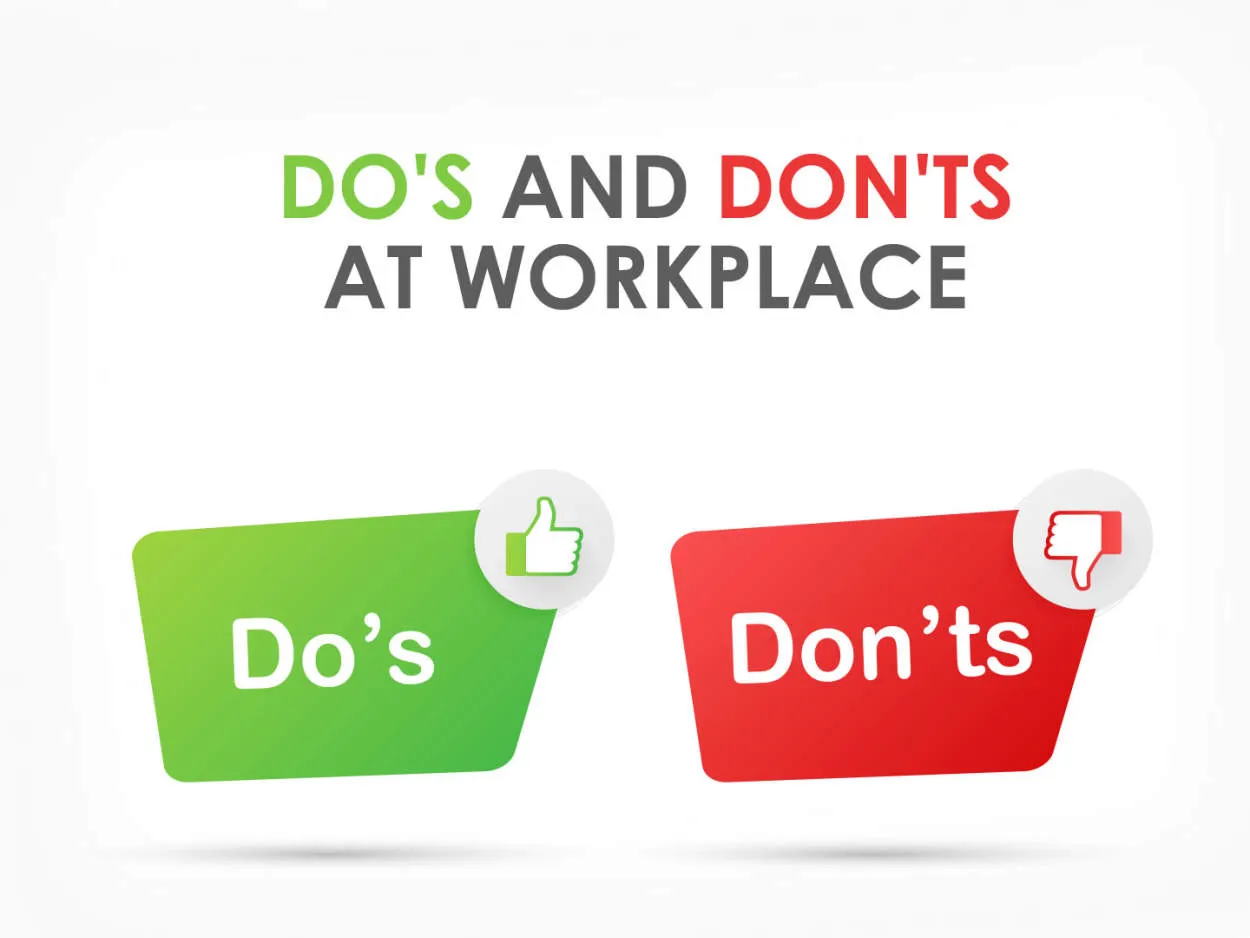Are you aware of the workplace etiquette dos and don’ts? Maintaining professional behavior is crucial for a harmonious work environment. In this article, we will explore essential tips and guidelines to navigate office etiquette and ensure a positive and productive workplace.
Respecting Personal Boundaries in the Office
When it comes to workplace etiquette, respecting personal boundaries is crucial for maintaining a healthy and professional environment. Here are some important dos and don’ts to consider:
Do:
- Be mindful of personal space: Give your colleagues enough room and avoid invading their personal space unless necessary.
- Communicate effectively: Use respectful language and tone when interacting with your coworkers, and be attentive to their needs and preferences.
- Respect scheduled breaks: Allow your colleagues to enjoy their designated breaks without unnecessary disruptions or distractions.
- Listen actively: Show interest and respect by actively listening to your colleagues during meetings or conversations.
- Follow office protocols: Adhere to company policies and guidelines concerning privacy, confidentiality, and personal boundaries.
Don’t:
- Invade personal belongings: Avoid going through your coworkers’ personal belongings or accessing their documents or devices without their permission.
- Assume familiarity: Not everyone appreciates physical contact or sharing personal information, so it is essential to avoid presuming familiarity with colleagues.
- Gossip or spread rumors: Engaging in office gossip can create a hostile work environment and violate personal boundaries. Refrain from participating in or spreading rumors.
- Make inappropriate comments or jokes: Be mindful of the language you use and avoid making offensive or inappropriate comments or jokes that may make others uncomfortable.
- Overstep professional boundaries: Remember that the office is a professional setting, and it is essential to maintain professional relationships with your colleagues.
Email and Communication Etiquette
In today’s digital age, communication in the workplace has largely shifted to emails. As such, it is crucial to adhere to proper email and communication etiquette. Here are some important dos and don’ts to keep in mind:
Do:
- Use a clear and concise subject line that accurately reflects the content of your email.
- Begin your email with a polite greeting, such as “Hi [Name]” or “Dear [Name].”
- Keep your message structured and organized by using paragraphs, bullet points, or numbered lists.
- Be mindful of your tone and choose your words carefully to avoid misunderstandings.
- Proofread your email before sending it to ensure it is free of typos and grammatical errors.
- Respond to emails promptly, even if it’s just to acknowledge receipt or indicate that you need more time.
Don’t:
- Use email as a means to convey sensitive or confidential information. Instead, opt for more secure methods of communication.
- Write unnecessarily long emails that can overwhelm the recipient.
- Include multiple people in the “CC” or “Reply All” unless absolutely necessary.
- Use excessive jargon or acronyms that may confuse the reader.
- Send irrelevant or unnecessary emails that clutter the recipient’s inbox.
- Reply to an email with a different subject by simply changing the subject line. Instead, start a new thread.
By following these email and communication etiquette guidelines, you can ensure effective and professional communication in the workplace, fostering positive relationships and minimizing misunderstandings.
Cultivating a Positive Work Environment
In today’s fast-paced and competitive corporate world, cultivating a positive work environment is essential for productivity, employee satisfaction, and overall success. Workplace etiquette plays a crucial role in creating a harmonious atmosphere where everyone can thrive. Here are some key dos and don’ts to keep in mind:
Dos:
- Respect your colleagues: Treat your coworkers with kindness, respect their opinions, and appreciate their contributions. Foster a culture of inclusivity and collaboration.
- Practice effective communication: Communicate clearly, listen actively, and be open to feedback. Effective communication reduces misunderstandings and promotes a positive work environment.
- Be punctual: Arrive on time for meetings, deadlines, and work in general. Respect other people’s time and prioritize punctuality.
- Maintain professionalism: Dress appropriately, adhere to company policies, and conduct yourself professionally. Show integrity and strive for excellence in your work.
- Express gratitude: Recognize and acknowledge your colleagues’ efforts and achievements. A simple “thank you” or a note of appreciation goes a long way in fostering positivity.
Don’ts:
- Avoid gossip and negativity: Engaging in gossip or spreading negativity creates a toxic work environment. Instead, focus on constructive conversations and offer support to your colleagues.
- Don’t interrupt or dominate discussions: Respect others’ opinions and allow everyone to have an equal opportunity to express themselves during meetings or brainstorming sessions.
- Avoid excessive smartphone use: While smartphones play a crucial role in our lives, excessive use during work hours can be distracting and disrespectful. Use them judiciously and prioritize work tasks.
- Don’t invade personal space: Respect personal boundaries and privacy. Avoid intruding into others’ workstations or personal lives without permission.
- Refrain from offensive language or behavior: Use appropriate language and be mindful of cultural sensitivities. Treat everyone with dignity and ensure your actions are inclusive and considerate.
By adhering to these workplace etiquette guidelines, individuals can contribute to creating a positive work environment that promotes productivity, collaboration, and overall job satisfaction. Remember, each person plays a vital role in shaping the atmosphere, so let’s strive to make our workplaces welcoming and supportive.
Conclusion
In conclusion, practicing good workplace etiquette is essential for maintaining a positive and professional work environment. By adhering to the dos and avoiding the don’ts, employees can build better relationships, prevent conflicts, and enhance productivity. Remember, small gestures like being punctual, respecting personal space, and showing appreciation can go a long way in creating a harmonious workplace.




